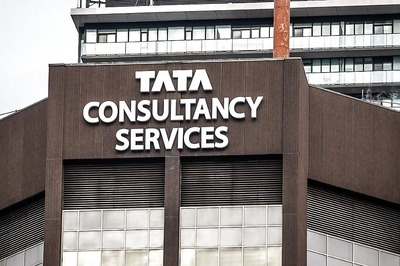
views
Experts said equity markets are experiencing a prolonged bull run and it is during this time that the midcap and smallcap segments tend to outshine their larger counterparts.
Till December 22 this year, the BSE smallcap gauge has jumped 13,074.96 points or 45.20 per cent while the midcap index has surged 10,568.18 points or 41.74 per cent.
In comparison, the BSE 30-share benchmark Sensex has rallied 10,266.22 points or 16.87 per cent during this period.
The smallcap index scaled its all-time high of 42,648.86 points on December 20 this year and the midcap gauge also reached its record peak of 36,483.16 points on the same day.
The BSE benchmark also hit its lifetime high of 71,913.07 points on December 20.
The midcap index tracks companies with a market value that is on an average one-fifth of blue chips while smallcap firms are almost a tenth of that universe.
Analysts attributed better domestic macroeconomic fundamentals and the confidence of retail investors as the major drivers for the exuberance in equity markets this year.
“When the overall economy becomes robust, small and midcap segments tend to do well,” Mukesh Kochar, National Head of Wealth at AUM Capital, said.
Kochar termed 2023 as a ”great year” as far as the equity market is concerned. ”We have seen a new high with broad-based participation,” he said.
In all bull runs, there has always have a new set of performers and this time PSU, defense and railways emerged as the greatest performers, he said, adding there have been strong Domestic Institutional Investors (DIIs) and retail money in a market where Foreign Institutional Investors (FIIs) were consistently selling.
“Despite FII selling, markets have created a new history with domestic liquidity. Overall a wonderful year for equity participants,” Kochar added.
But experts believe that smaller stocks may undergo corrections in the near term after a hefty rally in 2023.
After a turbulent start, the market got its mojo back during the final part of the year.
The smallcap and midcap indices hit their 52-week lows on March 28 this year. The BSE smallcap gauge fell to its one-year low of 26,120.32 points on March 28 while the midcap index hit its 52-week low of 23,356.61 points on the same day.
The BSE bellwether index hit its one-year low of 57,084.91 points on March 20 this year.
Investors battled a slew of negative news from turmoil in large global banks to macroeconomic concerns.
Selling by foreign investors in September and the outflow continuing in the succeeding month, elevated US interest rates and conflict in the Middle East played havoc in the markets in the month of October, where the BSE benchmark fell nearly 3 per cent.
But markets bounced back in the months of November and December.
According to analysts, smaller stocks are generally bought by local investors while overseas investors focus on blue chips or large firms.
Palka Arora Chopra, Director of Master Capital Services Ltd, highlighted a number of factors that led to markets rally this year, including increased retail investor participation, higher-than-expected GDP growth of 7.6 per cent in the September quarter and investors factoring in expectations of an early rate cut by the US Federal Reserve.
Other factors are indication of political stability after the 2024 Lok Sabha elections and foreign fund inflows in the equity market in 2023.
The total investment by Foreign Portfolio Investors (FPIs) surpassed Rs 1.62 lakh crore so far this year. FPIs have poured in over Rs 57,300 crore into the Indian equity markets so far this month.
On the reasons behind the outperformance of smallcap and midcap companies, Chopra said increasing risk appetite among investors driven by improving optimism in the economy and active participation from domestic investors have played a big role in pushing the broader market counters.
“The surge in the equity markets can be attributed primarily to the robust fundamentals of the Indian economy, resilient in the face of global challenges.
“A key driver has been the anticipation of sustained political stability and the likelihood of additional economic reforms, coupled with assurance of interest rates reaching their peak,” Sunil Nyati, Managing Director of Swastika Investmart Ltd, said.
Favourable external factors, such as decline in crude oil prices, a dip in US bond yields, and a weakening dollar index also provided additional tailwinds.
“The Indian equity markets are currently experiencing a prolonged structural bull run, characterised by a notable trend where midcap and smallcap segments tend to outshine their larger counterparts during bullish phases,” Nyati said.
Investors’ sentiments got a big boost in November and December which helped both domestic as well as global markets to scale new highs, according to a note by Motilal Oswal Broking and Distribution.
“Midcap and smallcap witnessed huge rallies this year,” it added.
According to Nyati, the record-breaking Systematic Investment Plan (SIP) flows into midcap and smallcap funds, indicate a growing appetite among retail investors for these segments.
On the road ahead for smallcap and midcap stocks in 2024, Nyati said their exuberant run might pause in the near term.
“The smallcap space has some froth and may correct a little bit. The midcap space still looks attractive. Largecaps may catch up as the valuation there looks cheap at this point in time,” Kochar said.
In 2022, the BSE midcap index climbed 344.42 points or 1.37 per cent while the smallcap gauge declined 530.97 points or 1.80 per cent.
The BSE barometer had ended 2022 with an annual gain of 4.44 per cent or 2,586.92 points.
In 2021, the midcap index gained 7,028.65 points or 39.17 per cent while the smallcap index zoomed 11,359.65 points or 62.76 per cent. In comparison, the Sensex jumped 10,502.49 points or 21.99 per cent that year.



















Comments
0 comment